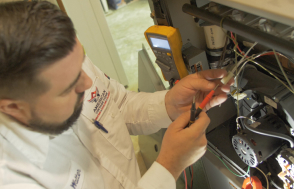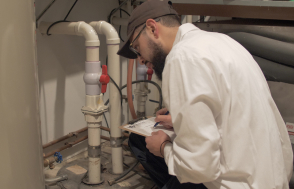Water Filtration & Conditioning in Chicago’s North Shore
Take Control of Your Water Quality
Just because your water looks clean, doesn’t mean it is. Water treatment facilities simply can’t remove all the chemicals present in our tap water. In fact, in order to produce disease-free, potable water, the city needs to add chemicals to the water supply, namely chlorine. You are probably already aware of this since you can often taste the chemicals present in your tap water. However, you may not know that there are trace amounts of over 250 other chemicals also present. These chemicals can come from a lot of different places, not just municipal treatment plants. We don’t yet know the long-term effects of ingesting trace amounts of so many chemicals throughout a lifetime, but common sense tells us we should be filtering the chemicals out before we ingest the water.
At American Vintage Home, we offer top-quality water purification and filtration solutions to ensure you have access to clean and healthy water. With our friendly water quality specialists on the job, you can rest easy knowing that there are no hidden contaminants in your family’s water supply.
Get the best home water purification system in your vintage home by working with the professionals at American Vintage Home today. If you’re in the Chicago North Shore area, call (847) 999-4595 or contact us online today.
The Difference With Water Filtration Systems
The best assurance against contaminated water is a water filtration system. These systems remove the chemicals that local treatment facilities can’t, and they reduce your chances of consuming the contaminants often present in tap and bottled water.
Stop settling for water that looks healthy — and instead enjoy water that is healthy. American Vintage Home can help with all of your water treatment and conditioning needs all throughout the Chicago North Shore.
View our special offers now and save on water quality services today!
What’s in Your Water?
Your water can contain a number of different contaminants, including:
- Chlorine and chloramines have been linked to a wide range of serious illnesses. You might not know it, but you will inhale and consume more chlorine in a 10-minute shower than you would by drinking eight glasses of the same water.
- Giardia is a chlorine-resistant protozoan that can cause severe gastrointestinal illness.
- Cyst is a parasite that can cause mild gastrointestinal illness.
- Lead seeps into pipe systems from lead solder that was largely used in copper pipes until 1987. Lead delays development in children and can cause kidney and blood pressure problems in adults.
- VOCs are chemical contaminants that are dissolved in water-based products such as insecticides and herbicides.
To make sure none of these contaminants find their way into your home water supply, call American Home Vintage at (847) 999-4595 to schedule a water filtration system installation.
We Are the Experts in Water Filtration Systems
With so many options, it’s not easy to know which system is right for your home. That’s where the experts at American Vintage Home come in.
We have spent years working with water filtration systems around the Chicago North Shore area. After identifying the contaminants present in your water supply, we will help you make an informed decision. This gives you peace of mind that your new system is not only a reliable choice — but the right choice.
Make the right choice and ensure your vintage home has the best water treatment and conditioning possible with the experts at American Vintage Home by calling (847) 999-4595 or contacting us today.
Questions about water filtration? View our Water Filtration FAQs!
Our Water Filtration Solutions, Services & Products
At American Vintage Home, we’re committed to ensuring you have safe, clean drinking water. That’s why we offer a range of water quality solutions and products, including:
- Free water test
- Whole-house carbon water filters
- Heater guardian sediment & scale filter
- Scale filter/ionizer
- Five-stage reverse osmosis filter
Making sure that your vintage home has a high-quality water filtration system is a large responsibility. Our experts at American Vintage Home are trained in making sure not only that your home is equipped with the best water treatment and conditioning possible, but also that you experience an unparalleled level of customer service while that’s happening. We’ve been serving the Chicago North Shore area for decades and are the leading professionals to help your vintage home run as smoothly and safely as possible.
To get started working with American Vintage Home and ensuring your home has the water purification system it needs, call (847) 999-4595.
Enjoy Safe, Clean Water With American Vintage Home
You can’t control where your drinking water comes from. But with the right water filtration system, you can control how clean it is by the time you and your family drink it. At American Vintage Home, we put our customers first, so you can count on us to find the ideal water filtration solution for your home. With our team on the job, unsafe contaminants will be a thing of the past.
Call American Vintage Home at (847) 999-4595 to get started with water filtration and purification services in the Chicago North Shore area.





